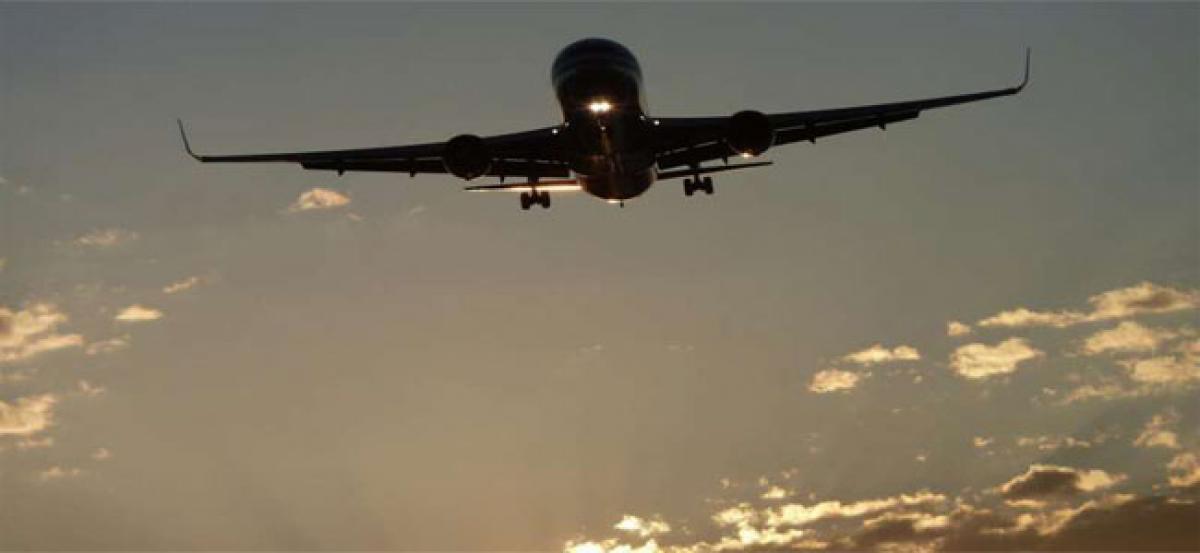Live
- Experts at COP29 urge India to tackle short-lived climate pollutants
- AGP inducts new locomotive
- Visakhapatnam: 31-year-old attacks girl for refusing his love
- MyVoice: Views of our readers 15th November 2024
- NWKRTC embraces digital payments to enhance passenger experience
- Beating plastic pollution,a serious task ahead
- Executive cannot ‘bulldoze’ judiciary: SC
- SC denies pre-arrest bail to Jaynarayan
- CM waives hostel food fee
- UBI celebrates 106th foundation day
Just In

Rising temperatures due to global warming will make it harder for aircraft around the world to take off in coming decades, according to a study. During the hottest parts of the day, 10 to 30 per cent of fully loaded planes may have to remove some fuel, cargo or passengers, or else wait for cooler hours to fly, researchers said.
New York : Rising temperatures due to global warming will make it harder for aircraft around the world to take off in coming decades, according to a study. During the hottest parts of the day, 10 to 30 per cent of fully loaded planes may have to remove some fuel, cargo or passengers, or else wait for cooler hours to fly, researchers said.
"Our results suggest that weight restriction may impose a non-trivial cost on airline and impact aviation operations around the world," said Ethan Coffel from Columbia University in the US. As air warms, it spreads out, and its density declines.
In thinner air, wings generate less lift as a plane races along a runway, researchers said. Thus, depending on aircraft model, runway length and other factors, at some point a packed plane may be unable to take off safely if the temperature gets too high. Weight must be dumped, or else the flight delayed or cancelled, they said.
Average global temperatures have gone up nearly one degree Celsius since about 1980, and this may already be having an effect.
Worldwide, average temperatures are expected to go up as much as another three degrees Celsius by 2100, they said. However, heat waves will probably become more prevalent, with annual maximum daily temperatures at airports worldwide projected to go up four to eight degrees Celsius by 2080, according to the study. It is these heat waves that may produce the most problems.
"This points to the unexplored risks of changing climate on aviation," said Radley Horton, a climatologist at Columbia University. "As the world gets more connected and aviation grows, there may be substantial potential for cascading effects, economic and otherwise," said Horton, coauthor of the study published in the journal Climatic Change.
Most studies so far have focused on how aviation may affect global warming (aircraft comprise about 2 per cent of global greenhouse-gas emissions), not vice versa.
However, a handful of studies have warned that warming climate may increase dangerous turbulence along major air routes, and head winds that could lengthen travel times. The new study projects effects on a wide range of jets at busiest airports in the US, Europe, The Middle East, China and south Asia.
The researchers estimate that if globe-warming emission continues unabated, fuel capacities and payload weights will have to be reduced by as much as four per cent on the hottest days for some aircraft.
If the world somehow manages to sharply reduce carbon emissions soon, such reductions may amount to as little as 0.5 per cent, they said. For an average aircraft operating today, a four per cent weight reduction would mean roughly 12 or 13 fewer passengers on an average 160-seat craft.

© 2024 Hyderabad Media House Limited/The Hans India. All rights reserved. Powered by hocalwire.com







